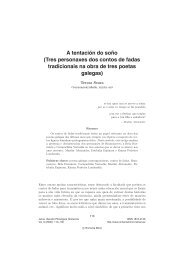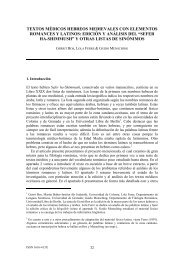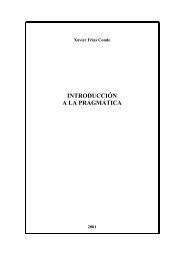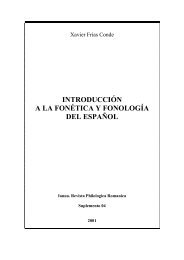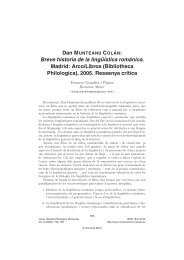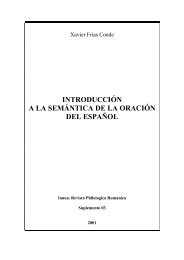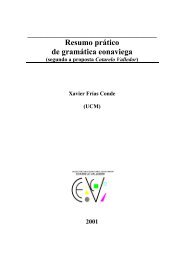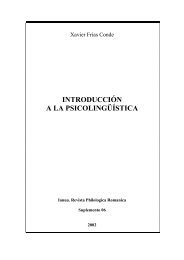A Latin etymology for Romanian da = yes - Romania Minor
A Latin etymology for Romanian da = yes - Romania Minor
A Latin etymology for Romanian da = yes - Romania Minor
You also want an ePaper? Increase the reach of your titles
YUMPU automatically turns print PDFs into web optimized ePapers that Google loves.
A <strong>Latin</strong> <strong>etymology</strong> <strong>for</strong> <strong><strong>Romania</strong>n</strong> <strong>da</strong> = <strong>yes</strong><br />
Keith Andrew Massey<br />
County College of Morris, New Jersey<br />
<br />
Abstract<br />
In this article the author argues that <strong>Latin</strong> ita is a possible source <strong>for</strong> <strong><strong>Romania</strong>n</strong><br />
<strong>da</strong> = <strong>yes</strong>, ordinarily assumed to be a Slavic borrowing. This emerges<br />
as phonologically possible, but unprovable. This controversial <strong>etymology</strong> is<br />
given even more credence by the demonstration that the <strong>Latin</strong> conjunction<br />
ita quod is a probable source <strong>for</strong> the <strong><strong>Romania</strong>n</strong> conditional particle <strong>da</strong>că.<br />
Keywords: <strong><strong>Romania</strong>n</strong>, <strong>Latin</strong>, <strong>da</strong>, <strong>da</strong>că, ita quod, <strong>yes</strong>, sic.<br />
Received: 02.i.2008 – Accepted: 30.vi.2008<br />
Table of Contents<br />
1 Introduction<br />
2 The Slavic Assumption <strong>for</strong> <strong>da</strong> = <strong>yes</strong><br />
3 <strong>Latin</strong> Affirmations and their Romance Counterparts<br />
4 <strong>Latin</strong> ita > <strong><strong>Romania</strong>n</strong> <strong>da</strong>?<br />
5 <strong><strong>Romania</strong>n</strong> <strong>da</strong>că = if<br />
6 The invisible <strong>da</strong> in early <strong><strong>Romania</strong>n</strong><br />
7 Conclusion<br />
References<br />
Ianua. Revista Philologica Romanica<br />
Vol. 8 (2008): 93–100<br />
93<br />
c○ <strong>Romania</strong> <strong>Minor</strong><br />
ISSN 1616-413X<br />
http://www.romaniaminor.net/ianua/
94 Keith Andrew Massey<br />
1 Introduction<br />
Among the Romance languages, the development of <strong><strong>Romania</strong>n</strong> is perhaps the<br />
least understood (Rosetti et al. 1969; Du Nay 1996; Sala 2005). There is an<br />
interval of several hundred years in which no historical record mentions its existence,<br />
1 let alone providing scholars with samples to track its evolution (Rosetti<br />
et al. 1969, 481; Sala 2005, 25).<br />
<strong><strong>Romania</strong>n</strong>, like all Romance languages, has its own distinct features, owing<br />
principally to its particular local influences. This includes a significant influx of<br />
Slavic borrowings. One word of apparently Slavic origin in <strong><strong>Romania</strong>n</strong> is <strong>da</strong> =<br />
<strong>yes</strong>. It seems impossible that any populace would choose to borrow such a basic<br />
word from another language. But the history of human speech does, in fact,<br />
attest examples of such counter-intuitive developments. 2<br />
In this particular case, however, I will argue that a possible <strong>Latin</strong> origin <strong>for</strong><br />
<strong><strong>Romania</strong>n</strong> <strong>da</strong> has been overlooked. With a Romance <strong>etymology</strong> <strong>for</strong> such a basic<br />
word established, a Slavic source may be unnecessary.<br />
2 The Slavic Assumption <strong>for</strong> <strong>da</strong> = <strong>yes</strong><br />
It is understan<strong>da</strong>ble that a Slavic origin of <strong><strong>Romania</strong>n</strong> <strong>da</strong> = <strong>yes</strong> should have been<br />
assumed and then never questioned (Cihac 1879, 89; Ciorănescu 2003, 276).<br />
Afterall, the words enjoy a perfect oneness of phonology and semantics. Further<br />
evidence <strong>for</strong> the assumption has been the observation that <strong>da</strong> appears relatively<br />
late in the <strong><strong>Romania</strong>n</strong> literary record, 3 suggesting not just a borrowing, but a<br />
recent one at that.<br />
1 The oldest possible reference to the <strong><strong>Romania</strong>n</strong> language is in the History of the Byzantine<br />
Chronicler Theophylactus Simocatta (circa 630), who reports that, during a campaign against the<br />
Avars in the Balkans in 587, a local person observing the load on an animal about to fall was heard to<br />
say «torna, torna» («turn back, turn back» (or, «it’s spilling, it’s spilling», Theophylacti Simocattae<br />
Historiae, II, 15, 6-9; Sala 2005, 20).<br />
A later Byzantine Chronicler, Theophanes the Confessor, recounts the same incident but adds<br />
the word «brother» (fratre) to the phrase. (Theophanis Chronographia, I, Anno 6079 (587), 14–19;<br />
Saramandu 2001-2002, 234). After that point, however, there exists a lacuna of several centuries.<br />
The oldest attested reference to a document in <strong><strong>Romania</strong>n</strong> comes from a <strong>Latin</strong> title of an oath<br />
made by Stephen the Great in 1485 in which it is reported that «Haec Inscriptio ex Valachico in<br />
<strong>Latin</strong>am versa est sed Rex Ruthenica Lingua scriptam accepta» (‘This Inscription was translated<br />
from Valachic [<strong><strong>Romania</strong>n</strong>] into <strong>Latin</strong>, But the King has received it written in the Ruthenian language<br />
[Slavic]’); Tomescu 1968, 40). The oldest surviving modern sample of <strong><strong>Romania</strong>n</strong> is a letter written<br />
in 1521 from Neacsu of Cimpulung to Hans Benkner, a judge in Brasov (Rosetti et al. 1969, 468).<br />
2 Indeed, the borrowing of a <strong>yes</strong>-particle is attested in Slovene ja and Czech jo from the German<br />
(Elsik & Matras 2006, 429). A language may borrow <strong>for</strong>eign words <strong>for</strong> which it already has a<br />
perfectly good item because of some nuance, such as prestige (Campbell 2004, 64-65).<br />
3 It is not attested prior to the second half of the 18 th century. See Dimitrescu (1978, 345);<br />
Niculescu (1961; 1965), and Vrabie (1981, 237).<br />
c○ <strong>Romania</strong> <strong>Minor</strong><br />
http://www.romaniaminor.net/ianua/
A <strong>Latin</strong> <strong>etymology</strong> <strong>for</strong> <strong><strong>Romania</strong>n</strong> <strong>da</strong> = <strong>yes</strong> 95<br />
3 <strong>Latin</strong> Affirmations and their Romance Counterparts<br />
Classical <strong>Latin</strong> did not have only one lexical item <strong>for</strong> ‘<strong>yes</strong>’. Instead, speakers of<br />
<strong>Latin</strong> tended to employ a rich combination of words and expressions. Among<br />
these were sic, ita, vero, as well as merely repeating a phrase in full (Buck<br />
& Hale 1903, 137). 4 In Late <strong>Latin</strong>, it appears that the word sic reached a<br />
level of predominance (Pucci & Harrington 1997, 11), 5 setting the stage <strong>for</strong><br />
the current usage of Spanish, Portuguese, Italian, and French. 6 <strong>Latin</strong> sic did<br />
survive into <strong><strong>Romania</strong>n</strong> with arguably an even greater prevalence, becoming the<br />
basic conjunction şi, ‘and’ (Ciorănescu 2003, 713).<br />
4 <strong>Latin</strong> ita > <strong><strong>Romania</strong>n</strong> <strong>da</strong>?<br />
Because of their similarity in <strong>for</strong>m and meaning, an etymological derivation of<br />
<strong><strong>Romania</strong>n</strong> <strong>da</strong> from <strong>Latin</strong> ita would seem an intriguing possibility. The evolution<br />
of ita into <strong>da</strong> could have followed two routes.<br />
4.1 ita > *i<strong>da</strong> > <strong>da</strong><br />
Though not represented in the orthography, Late <strong>Latin</strong> seems to have undergone<br />
a general voicing of intervocalic consonants, though the Romance languages<br />
outside the Iberian Peninsula subsequently experienced a significant degree of<br />
regression from this voicing (Cravens 1996, 65-66). As such, an intermediate<br />
<strong>for</strong>m ∗ i<strong>da</strong> likely existed at least in pronunciation. While <strong><strong>Romania</strong>n</strong> experienced<br />
an almost total devoicing, sporadic preservation of voicing is attested. 7 This<br />
would, however, leave the question of why <strong><strong>Romania</strong>n</strong> would atypically preserve<br />
the voicing in this particular word.<br />
An explanation <strong>for</strong> this atypical preservation could be found in the relative<br />
frequency of ‘<strong>yes</strong>’ in any language. The so-called «frequency effect» can result in<br />
relatively rapid evolution of lexical items which are in common use (Bybee 2001,<br />
11). Further, given the overall economy of language, there is a tendency toward<br />
ease in pronunciation, especially in frequently produced lexical items (Zipf 1929).<br />
Voiced consonants are relatively shorter than their unvoiced counterparts, 8 thus<br />
anticipating a preference <strong>for</strong> preserving voicing within frequently used words.<br />
The loss of the initial vowel in the hypothetical ∗ i<strong>da</strong> is more predictable.<br />
In the stage of Classical <strong>Latin</strong>, the word ita shifted the accent to the final<br />
syllable when the word received enclitic elements. 9 This could have resulted in<br />
4 Ita and vero were also frequently used together to <strong>for</strong>m a single affirmative statement, ita vero<br />
(e.g., Plautus’ Miles Gloriosus III.ii.844)<br />
5 Thus Abelard is able to title his definitive work Sic et Non (Yes and No).<br />
6 French, of course, preserves si <strong>for</strong> responses to negative questions (Andison 1923, 85).<br />
7 E.g., <strong>Latin</strong> vitricus > Rom. vitreg (Dimitrescu 1978, 177). See also Lloyd (1987, 30).<br />
8 See LaVoie (2001, 9) and Blevins (2004, 145).<br />
9 E.g., itáque (Tucker 1965, 449).<br />
Ianua 8 (2008)<br />
ISSN 1616-413X
96 Keith Andrew Massey<br />
a move toward final accentuation overall. The loss of unaccented initial vowels<br />
in <strong><strong>Romania</strong>n</strong>, though not universal, is regularly attested. 10<br />
4.2 ita > *ta > <strong>da</strong><br />
Another possible route from ita to <strong>da</strong> would be to posit loss of the initial vowel<br />
prior to voicing. While not an ordinary development in <strong><strong>Romania</strong>n</strong>, sporadic<br />
voicing of initial stops is also attested. 11 The same argument regarding voicing<br />
of frequently used words would also apply to this case.<br />
4.3 <strong>Latin</strong> ita > <strong><strong>Romania</strong>n</strong> <strong>da</strong> possible but improbable<br />
The evolution of <strong>Latin</strong> ita into <strong><strong>Romania</strong>n</strong> <strong>da</strong> can be demonstrated as phonologically<br />
possible. Nevertheless, the posited intermediate <strong>for</strong>ms are unattested.<br />
Additionally, the proposed development appeals more to exceptions to rules than<br />
to regularly observed tendencies in <strong><strong>Romania</strong>n</strong>. Without further evidence, there<br />
would be no compelling reason to question the assumed Slavic origin of <strong><strong>Romania</strong>n</strong><br />
<strong>da</strong>. What will shift this balance, however, is the demonstration that <strong>Latin</strong><br />
ita has indeed survived in <strong><strong>Romania</strong>n</strong> as <strong>da</strong> —in another <strong>for</strong>m.<br />
5 <strong><strong>Romania</strong>n</strong> <strong>da</strong>că = if<br />
<strong><strong>Romania</strong>n</strong> is alone among the Romance languages in discontinuing use of <strong>Latin</strong><br />
si = if; <strong><strong>Romania</strong>n</strong> se (să) was replaced by <strong>da</strong>că, first in temporal clauses and<br />
eventually in all conditional clauses (Roques 1907, 825-839).<br />
5.1 The traditional <strong>etymology</strong> of <strong>da</strong>că<br />
Within the earliest recorded <strong><strong>Romania</strong>n</strong> the alternative <strong>for</strong>ms deca, déca, and<br />
deaca are also in currency. 12 This directed lexicographers to an assumed <strong>etymology</strong><br />
of the item from <strong>Latin</strong> ∗ de quod or ∗ de ad quod. 13 The <strong>for</strong>m <strong>da</strong>că<br />
has been explained as an evolution from what are assumed, on the basis of the<br />
proposed <strong>etymology</strong>, to be the original <strong>for</strong>ms (Rosetti 1983, 121-122).<br />
A problem with deriving <strong>da</strong>că from ∗ de quod / ∗ de ad quod is that neither<br />
of these particular combinations is attested in <strong>Latin</strong>, even during the Medieval<br />
period. While it is not impossible <strong>for</strong> an otherwise unattested combination of<br />
words to have existed, an <strong>etymology</strong> citing attested <strong>for</strong>ms would be preferable.<br />
10E.g., <strong>Latin</strong> excadere > Rom. scadea; <strong>Latin</strong> excambiare > Rom. schimba. Initial î is also<br />
ordinarily dropped by elision to other elements (Andersen 1986, 553).<br />
11E.g., <strong>Latin</strong> crassus > <strong><strong>Romania</strong>n</strong> gras (Dimitrescu 1978, 177); <strong>Latin</strong> ∗cavula > Rom. gaura<br />
(Ciorănescu 2003, 355).<br />
12All of which are attested in the early years of the 17th Century (Gheție & Mareş 1974, 89).<br />
13See Gheție & Mareş (1974, 88) and Cihac (1879, 32).<br />
c○ <strong>Romania</strong> <strong>Minor</strong><br />
http://www.romaniaminor.net/ianua/
A <strong>Latin</strong> <strong>etymology</strong> <strong>for</strong> <strong><strong>Romania</strong>n</strong> <strong>da</strong> = <strong>yes</strong> 97<br />
5.2 A new proposal <strong>for</strong> a <strong>Latin</strong> source of <strong><strong>Romania</strong>n</strong> <strong>da</strong>că<br />
One feature of Late <strong>Latin</strong> is the replacement of ut by quod in subordinate clauses<br />
(Pucci & Harrington 1997, 38). For result clauses specifically, the compound ita<br />
quod = ‘so that’ became common. The combination ita quod is abun<strong>da</strong>ntly<br />
attested and enjoys a stable life within <strong>Latin</strong> throughout the Medieval period.<br />
As a bound pair, they came sometimes to be spelled as a single word, itaquod. 14<br />
Employing the same phonological shifts proposed above, itaquod would produce<br />
the <strong>for</strong>m <strong>da</strong>că in <strong><strong>Romania</strong>n</strong>. 15 In addition to providing an <strong>etymology</strong> <strong>for</strong><br />
<strong>da</strong>că from an attested <strong>for</strong>m, ita quod, like <strong>da</strong>că, is also observed to evolve in the<br />
direction of a conditional particle. Intriguingly, at virtually the same time <strong>da</strong>că<br />
in <strong><strong>Romania</strong>n</strong> is beginning to supplant si, Francis Bacon, in a legal discussion,<br />
compares clauses introduced by <strong>Latin</strong> ita quod and si. He notes that, while<br />
ita quod ordinarily governs a subsequent conditional clause and si a precedent<br />
conditional clause, those categories can blur:<br />
... these words, ita quod and si, howsoever in propriety the ita quod may<br />
seem subsequent and the si precedent, yet they both bow to the sense. [In<br />
the clause si ipse vellet habitare et residens esse:] there the word si amounts<br />
to a condition subsequent, <strong>for</strong> he could not be resident be<strong>for</strong>e he took the<br />
state; and so via versa may ita quod be precedent, <strong>for</strong> else it must be idle<br />
and void. (Bacon 1861, 82-83)<br />
While the <strong>for</strong>ms déca, deca and deaca are indeed early, the specific <strong>for</strong>m <strong>da</strong>că<br />
is attested in the very earliest records <strong>for</strong> <strong><strong>Romania</strong>n</strong>, appearing in a letter of<br />
Cyrillic orthography <strong>da</strong>ted 1581 (Hasdeu 1878, 29).<br />
The <strong>for</strong>ms déca, deca, and deaca could themselves have been regional variations.<br />
Folk <strong>etymology</strong> assuming a link between <strong>da</strong>că and the preposition de may<br />
have resulted in a sporadic realization of the word with these alternative pronunciations.<br />
At any rate, the emergence of <strong>da</strong>că as the stan<strong>da</strong>rd <strong>for</strong>m throughout<br />
all of the <strong><strong>Romania</strong>n</strong> dialects suggests that, in addition to as great a claim <strong>for</strong><br />
antiquity, it always enjoyed the wider distribution.<br />
6 The invisible <strong>da</strong> in early <strong><strong>Romania</strong>n</strong><br />
The demonstration that ita quod provides a possible source <strong>for</strong> <strong><strong>Romania</strong>n</strong> <strong>da</strong>că<br />
puts the potential <strong>etymology</strong> of <strong>da</strong> from ita on a firmer footing. But if that is so,<br />
then <strong>da</strong> resided in the language <strong>for</strong> about two hundred years be<strong>for</strong>e appearing<br />
in literary record. This is not, however, an uncommon phenomenon. In the case<br />
of <strong><strong>Romania</strong>n</strong>, there had been somewhat scanty orthographic evidence <strong>for</strong> the<br />
language prior to the period in which <strong>da</strong> allegedly «appears» as a presumptive<br />
Slavic borrowing. The earliest records <strong>for</strong> the <strong><strong>Romania</strong>n</strong> language were, by<br />
definition, from the more educated registers. If <strong>da</strong>, even as a borrowing, were a<br />
14 E.g., «Itaquod in omni eventu valeat...» (‘So that it might be valid in any event’), from a letter<br />
written in the year 1263 by Beatrice of Savoy (Viard 1942, 132-134).<br />
15 For <strong>Latin</strong> quod > Rom. că, see Cihac (1879, 32) and Ciorănescu (2003, 130).<br />
Ianua 8 (2008)<br />
ISSN 1616-413X
98 Keith Andrew Massey<br />
more colloquial term, it could have been a part of the language long be<strong>for</strong>e it<br />
first appears in writing. 16 The relatively late appearance of <strong>da</strong> does not, then,<br />
exclude the possibility that the word has a <strong>Latin</strong> origin but remained unattested<br />
in <strong><strong>Romania</strong>n</strong> until a late <strong>da</strong>te.<br />
7 Conclusion<br />
It is un<strong>for</strong>tunate that the development of the <strong><strong>Romania</strong>n</strong> language is so obscured<br />
by scanty record. As a result, many etymologies will never be proven conclusively.<br />
In the present case, I have demonstrated that phonological developments<br />
could explain how a word <strong>for</strong> <strong>yes</strong> in <strong>Latin</strong>, ita, would produce in <strong><strong>Romania</strong>n</strong> the<br />
<strong>for</strong>m <strong>da</strong>. By the same token, <strong><strong>Romania</strong>n</strong> <strong>da</strong>că finds a more satisfactory <strong>etymology</strong><br />
in the <strong>Latin</strong> compound conjunction ita quod. Even though <strong>da</strong> itself does<br />
not appear until late in recorded <strong><strong>Romania</strong>n</strong>, the word could have been a more<br />
colloquial affirmation up to that point.<br />
It is even possible that <strong>Latin</strong> ita, preserved as <strong>da</strong> in <strong><strong>Romania</strong>n</strong>, eventually<br />
emerged as the stan<strong>da</strong>rd affirmation in <strong><strong>Romania</strong>n</strong> under the influence of the<br />
Balkan milieu. In this case, the Slavic word of identical phonology and semantics<br />
does not so much replace a <strong><strong>Romania</strong>n</strong> word as draw out a legitimate Romance<br />
word from a substan<strong>da</strong>rd register. It is unlikely that further epigraphical evidence<br />
will shed any more light on the topic. But a <strong>Latin</strong> source <strong>for</strong> this basic<br />
word is at least a plausible option.<br />
References<br />
Andersen, Henning (1986): Sandhi Phenomena in the Languages of Europe.<br />
New York: Mouton de Gruyter.<br />
Andison, John Gordon (1923): The Affirmative Particles in French. Toronto:<br />
University of Toronto Press.<br />
Bacon, Francis (1861): «The Case of Revocation of Uses.» In: James Spedding<br />
& Douglas Denon Heath [eds.], Literary and Professional Works of<br />
Francis Bacon. London: Longman & Co. [et al.].<br />
Blevins, Juliette (2004): Evolutionary Phonology: The Emergence of Sound<br />
Patterns. Cambridge: Cambridge University Press.<br />
Buck, Carl Darling; Hale, William Gardner (1903): A <strong>Latin</strong> Grammar.<br />
Boston: Ginn & Company.<br />
Bybee, Joan L. (2001): Phonology and Language Use. Cambridge: Cambridge<br />
University Press.<br />
16 A demonstration by analogy can be drawn from the case of the Hebrew language. By the first<br />
century AD, a sizable corpus of recorded language had developed. But when modern archaeology<br />
added linguistic records to this corpus, virtually every new text presented words never be<strong>for</strong>e seen.<br />
Despite the record of approximately 2,500 personal names in the Hebrew Bible, one new inscription<br />
consisting of simply ten names presented three previously unattested (Gibson 1971, 36-37).<br />
c○ <strong>Romania</strong> <strong>Minor</strong><br />
http://www.romaniaminor.net/ianua/
A <strong>Latin</strong> <strong>etymology</strong> <strong>for</strong> <strong><strong>Romania</strong>n</strong> <strong>da</strong> = <strong>yes</strong> 99<br />
Campbell, Lyle (2004): Historical Linguistics: An Introduction. Cambridge<br />
(MA): MIT Press.<br />
Cihac, Alexandru (1879): Dictionnaire d’étymologie <strong>da</strong>co-romane, éléments<br />
slaves, magyars, turcs, grecs-moderne et albanais. Frankfurt: Ludolphe<br />
St-Goar. [Available online. URL: ].<br />
Ciorănescu, Alexandru (2003): Dictionarul Etimologic Al Limbii Române.<br />
Bucharest: Saeculum.<br />
Cravens, Thomas D. (1996): «Phonology, phonetics, and orthography in Late<br />
<strong>Latin</strong> and Romance: the evidence <strong>for</strong> early intervocalic sonorization.» In:<br />
Roger Wright [ed.], <strong>Latin</strong> and the Romance Languages in the Early Middle<br />
Ages. University Park (PA): Pennsylvania State University Press, 52–68.<br />
Dimitrescu, Florica (1978): Istoria Limbii Române. Bucharest: Editura<br />
Di<strong>da</strong>ctică şi Pe<strong>da</strong>gogică.<br />
Du Nay, André (1977): The Early History of the Rumanian Language. Lake<br />
Bluff (IL): Jupiter Press.<br />
(1996): The origins of the Rumanians: the early history of the<br />
Rumanian language. Buffalo: Matthias Corvinus.<br />
Elsik, Viktor; Matras, Yaron (2006): Markedness and Language Change:<br />
The Romani Sample. Berlin; New York: Walter de Gruyter.<br />
Gheție, Ion; Mareş, Alexandru (1974): Graiurile <strong>da</strong>coromâne în secolul al<br />
xvi-lea. Bucharest: Editura Academiei Republicii Socialiste România.<br />
Gibson, John C.L. (1971): Textbook of Syrian Semitic Inscriptions. Volume<br />
1: Hebrew and Moabite Inscriptions. Ox<strong>for</strong>d: Clarendon Press.<br />
Hasdeu, Bog<strong>da</strong>n Petriceicu (1878): Cuvente der Vătruni. Limba Română<br />
Vorbită între 1550-1600. Bucharest.<br />
LaVoie, Lisa M. (2001): Consonant Strength: Phonological Patterns and<br />
Phonetic Manifestations. New York: Routledge.<br />
Lloyd, Paul M. (1987): From <strong>Latin</strong> to Spanish. Darby (PA): American<br />
Philosophical Society.<br />
Niculescu, Alexandru (1961): «Afirmarea prin <strong>da</strong> în limba româna.» Studii<br />
şi Cercetări Lingvistice 12 (4): 479–486.<br />
(1965): Individualitatea limbii române între limbile romanice.<br />
Bucharest: Editura Ştiințifică.<br />
Pucci, Joseph Michael; Harrington, Karl Pomeroy (1997): Medieval <strong>Latin</strong>.<br />
Chicago: University of Chicago Press.<br />
Roques, Mario (1907): «Recherches sur les conditionnelles sa*, de, <strong>da</strong>că*, en<br />
Ancien Roumain.» Romanische Forschungen 23 (2): 825–839.<br />
Rosetti, Alexandru (1983): Études de linguistique générale. Bucharest:<br />
Editura Univers.<br />
Ianua 8 (2008)<br />
ISSN 1616-413X
100 Keith Andrew Massey<br />
Rosetti, Alexandru [et al.] (1969): Istoria limbii române. Vol. II. Bucharest:<br />
Editura Academiei Române.<br />
Sala, Marius (2005): From <strong>Latin</strong> to <strong><strong>Romania</strong>n</strong>: The Historical Development<br />
of <strong><strong>Romania</strong>n</strong> in a Comparative Romance Context. Jackson (MS): Romance<br />
Monographs.<br />
Saramandu, Nicolae (2001–2002): «Torna, torna, fratre.» Fonetică şi dialectologie<br />
XX-XXI:233–252. [Available online. URL: ].<br />
Tomescu, Mircea (1968): Istoria cărții româneşti de la începuturi pînă la<br />
1918. Bucharest: Editura Ştiințifică.<br />
Tucker, R. Whitney (1965): «Accentuation be<strong>for</strong>e Enclitics in <strong>Latin</strong>.»<br />
Transactions and Proceedings of the American Philological Association<br />
96:449–461.<br />
Viard, Francisque (1942): Béatrice de Savoye. Lyon.<br />
Vrabie, Emil. (1981): «Linguistic aspects of the question of the <strong><strong>Romania</strong>n</strong>s’<br />
continuity in Dacia: A critical study.» Revue Roumaine de Lingvistique<br />
26:213–262. [Review of Du Nay (1977)].<br />
Zipf, George Kingsley (1929): «Relative Frequency as a Determinant of<br />
Phonetic Change.» Harvard Studies in Classical Philology 40:1–95.<br />
c○ <strong>Romania</strong> <strong>Minor</strong><br />
http://www.romaniaminor.net/ianua/



